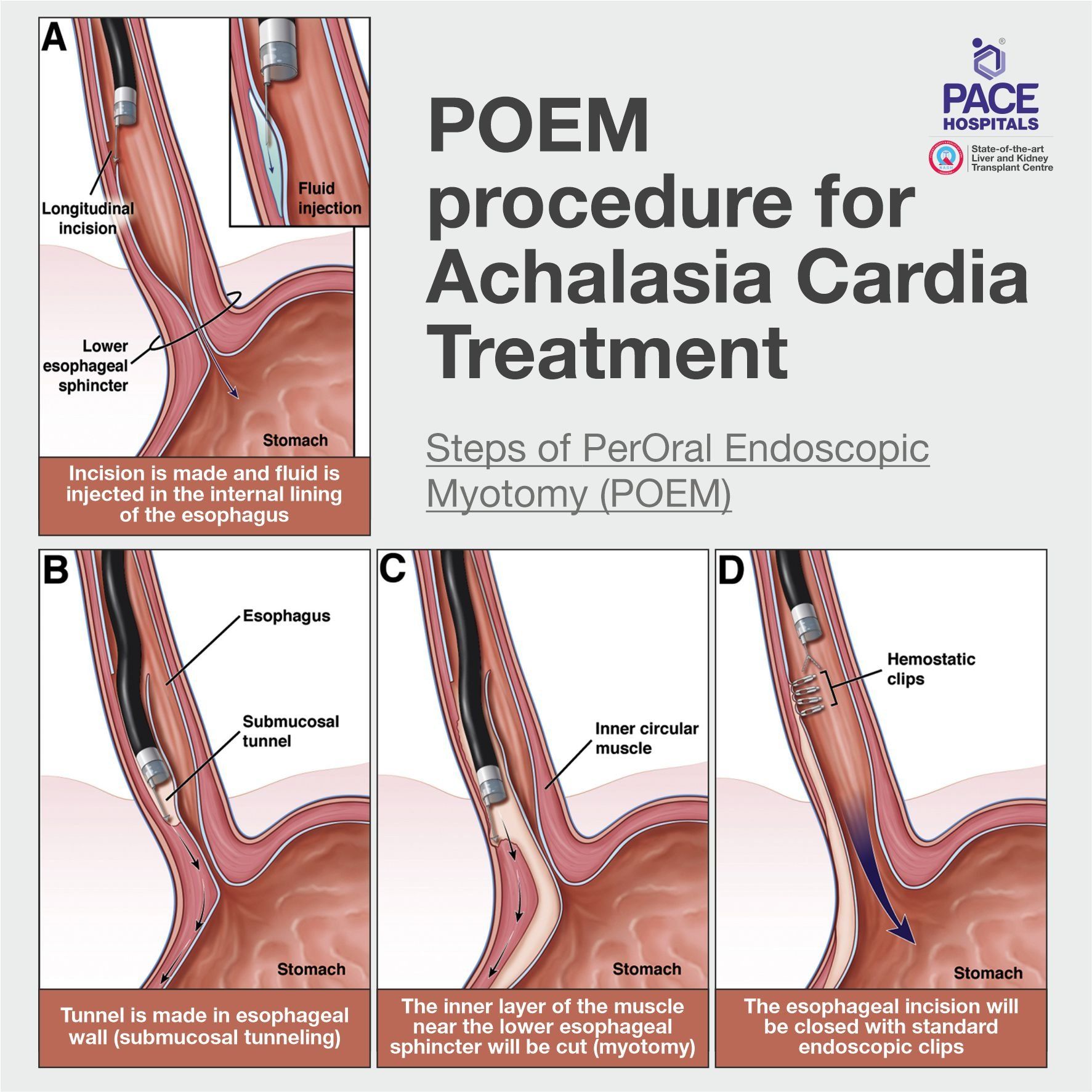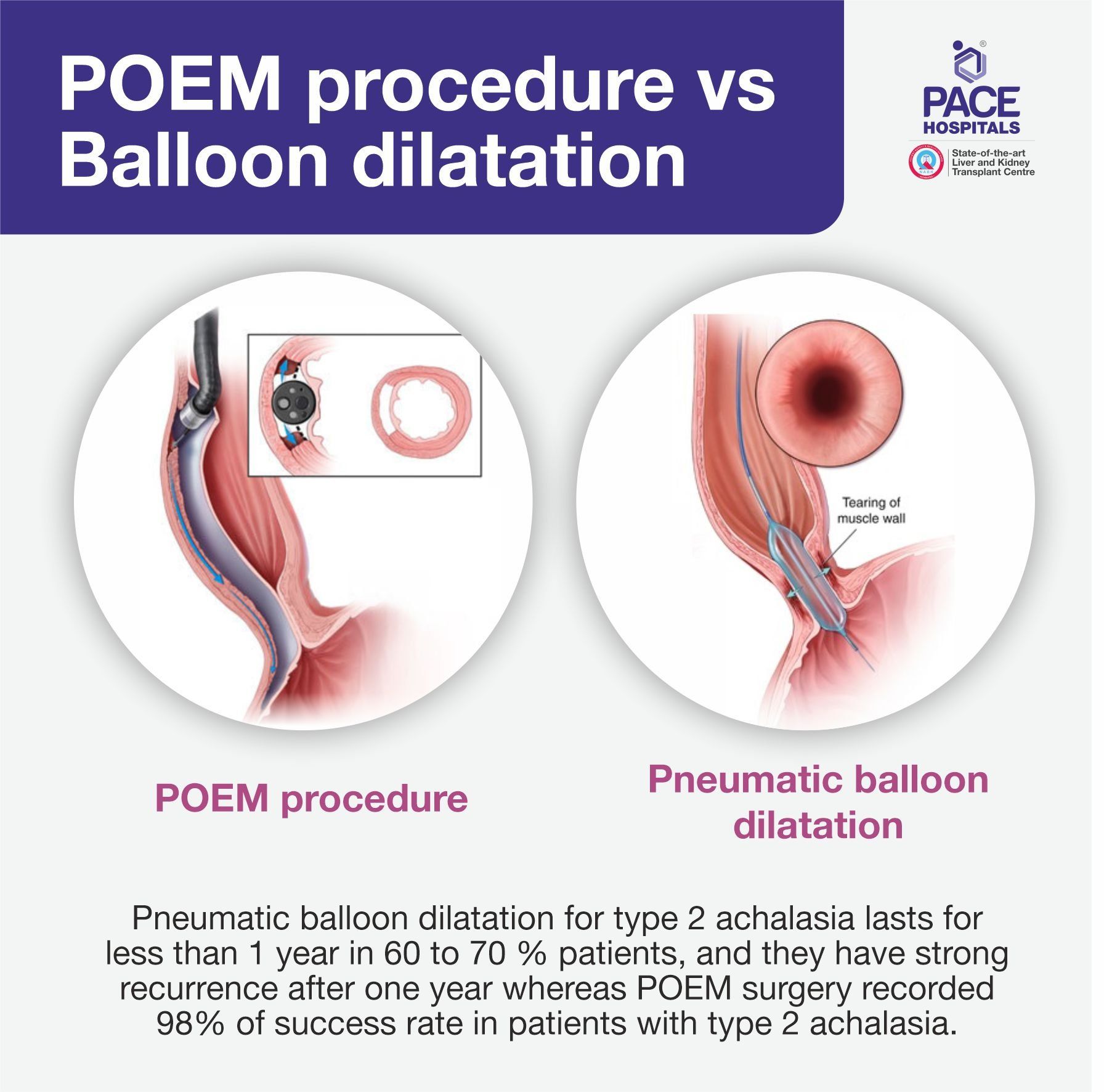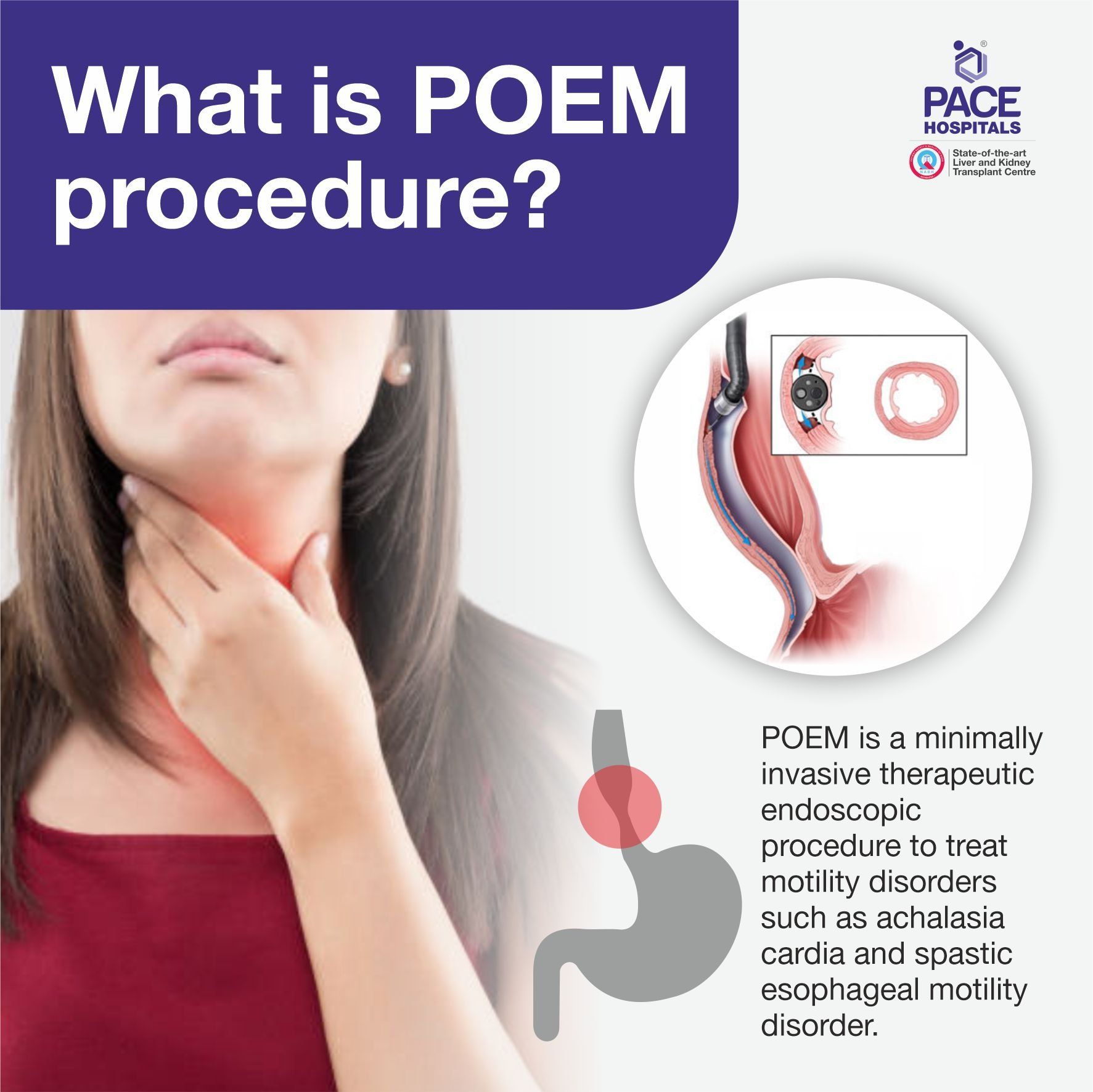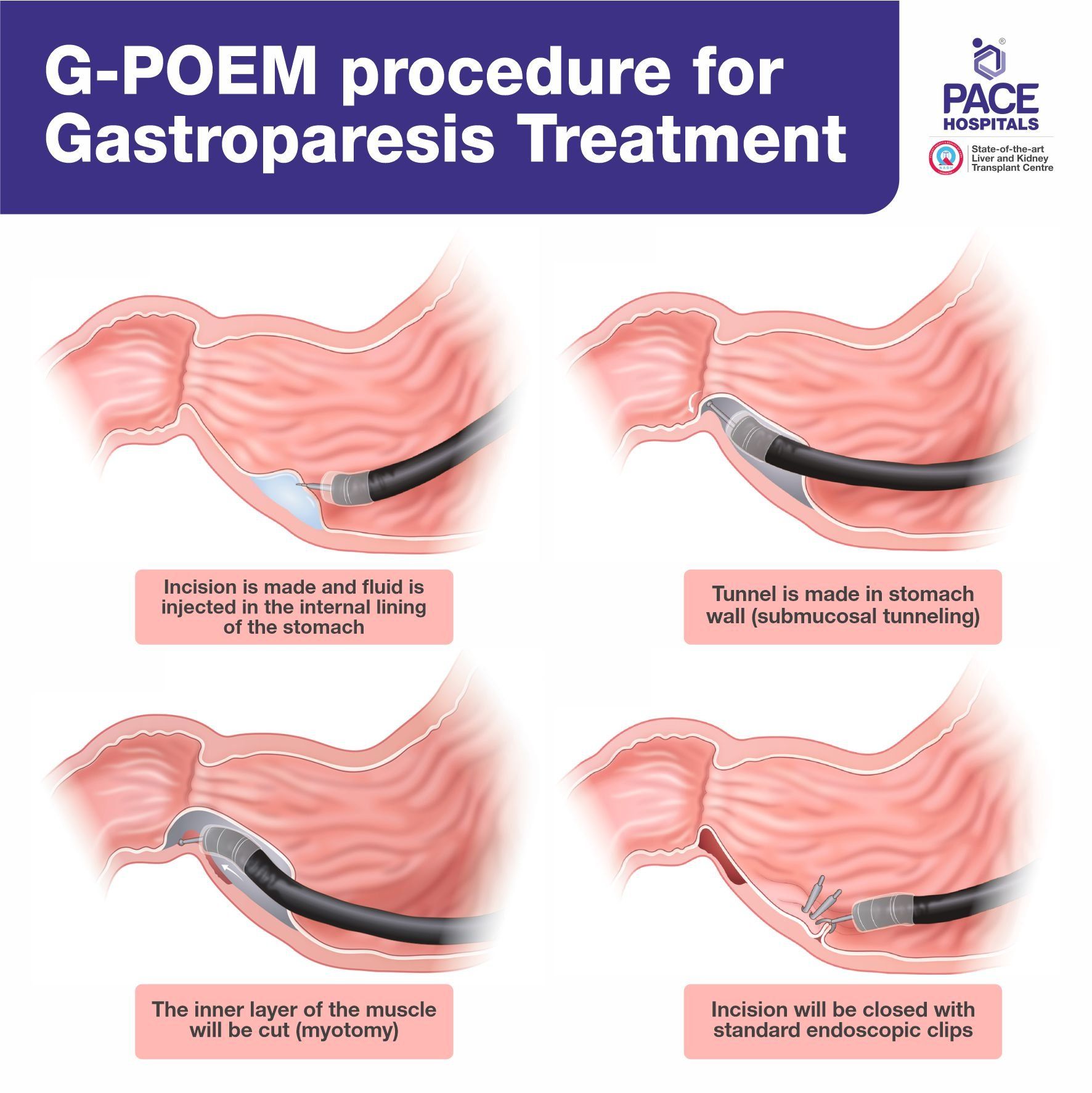POEM for Achalasia Cardia Treatment in Hyderabad | Cost and Benefits
At PACE Hospitals, the advanced endoscopic suite is equipped with world-class third space endoscopic equipment to perform minimally invasive major and supra-major endoscopic procedures.
Our team of gastroenterologist and gastroenterology specialist are having extensive experience in performing POEM procedure.
What is POEM procedure?
POEM medical abbreviation - Peroral Endoscopic Myotomy
Peroral means going through the mouth, Endoscopic means when doctors are using the scope and Myotomy when they are cutting the muscles.
POEM is a minimally invasive therapeutic endoscopic procedure to treat severe swallowing disorders by going through the mouth and treating certain esophageal disorders by cutting the muscles. This endo-surgery technique is most commonly used for the treatment of
achalasia cardia
and spastic esophageal motility disorder.
Achalasia cardia is a common motility disorder characterized by a high pressure of the lower esophageal sphincter where lower esophageal sphincter failed to relax and motility problem where movement of esophagus called as peristalsis is not functioning properly resulting difficulty in swallowing.
The lower esophageal sphincter (LES), it is the muscle that controls emptying of the esophagus into the stomach in patients with achalasia cardia it is in tight spasm. This may result in dysphagia (unable to swallow food) leading to weight loss, food regurgitation, heartburn, coughing at night, chest pain on and off, and weight loss.
Spastic Esophageal Motility Disorder (EMD) is a disorder that’s characterized by uncoordinated contractions of the esophagus that can cause swallowing difficulties, muscles spasms or regurgitation of the food back to mouth. There are different types of EMD such as diffuse esophageal spasm, nutcracker esophagus and hypertensive lower esophageal sphincter.
Endoscopes are flexible tubes having camera on the tip of the tube, gastroenterologist insert endoscope through the mouth or colon to examine the esophagus, stomach, intestine and colon without making any incision on the body.
Endoscopic procedure allows doctors to diagnose or treat the conditions related to swallowing disorder and bowel obstructions without making any incision elsewhere in the body, due to this patients can avoid having longer hospitalization or no hospitalization at all after the procedure.
What is G-POEM procedure?
G-POEM medical abbreviation – Gastric Peroral Endoscopic Myotomy
Recent advancement in third space endoscopy, POEM procedure has a new development that is Gastric POEM (G-POEM) that is used for the treatment of refractory gastroparesis.
Gastroparesis is a motility disorder that affects normal movement of the stomach muscles, resulting in improper emptying of the stomach. Actual cause of gastroparesis is not known, usually found in patients with diabetes complications or surgery or some medicine that can slow down the stomach emptying process. This may result in nausea, vomiting, abdominal pain, bloating, weight loss, acid reflux etc.
What are the indications of POEM procedure?
Patients those are having severe symptoms of swallowing difficulty that is affecting their quality of life, losing weight or not able to gain weight and having chronic acid reflux are significantly symptomatic and definitely they are eligible for the POEM procedure.
What are the advantages of POEM procedure?
POEM procedure is a new endoscopic technique and have better results than Heller’s myotomy (laparoscopic surgical procedure) and balloon dilation (with a high recurrence rate) for dysphagia treatment. There are many benefits of POEM procedure that includes:
- Scarless endoscopic procedure
- Requires less sedation during procedure
- Shorter operative time
- Very minimal blood loss
- Shorter hospitalization
- Quicker recovery time
- Less risk of infection post procedure
- Effective in patients those previous surgeries was not successful
Who all are the candidates of POEM procedure?
Gastroenterologist select patients those are presented with swallowing difficulty for POEM procedure after doing thorough physical and medication examination for dysphagia treatment on the basis of the following investigation:
- Esophageal manometry – It is a test to assess motor function of the esophageal body, upper and lower esophageal sphincter. By doing this test doctor can differentiate the type of achalasia cardia type1, type 2 and type 3. It also diagnoses the spastic esophageal motility disorder.
- X-ray barium swallow - It is a radiology examination for the upper gastrointestinal (GI) tract. By this doctors can diagnose structural or functional issues of the upper GI tract.
- Upper GI endoscopy - It is a non-surgical procedure used to find out the disease and conditions related to digestive system like difficulty swallowing, abdominal pain, gastritis, and ulcers, bleeding in digestive tract, bowel habit changes, colon growth or polyps.
- 24 hour PH metry – It is a test to assess 24 hours monitoring whether acid is coming back into the esophagus from the stomach causing pain, nausea, heartburn, and chest pain
What to expect before the POEM procedure?
Patients need to follow the preparations as advised by primary care doctor before POEM operation. Patients are required to follow a liquid diet for at least 48 hours that will make esophagus and stomach clear so that the procedure can happen smoothly.
Simultaneously patients are required to be on fasting for 12 hours before the procedure, if they are having any heart conditions or diabetes discuss before taking medicines for pre-existing disease.
After hospitalization, doctor will do thorough evaluation and physical examination of the patients to make them ready for the procedure.
What to expect during the POEM procedure?
Once all physical and medical examination successfully completed, the patient will be shifted to endoscopic suite or operation theater where general anesthesia is given for POEM operation.
During the procedure the doctor passes a special endoscope through the mouth to reach the esophagus, with the help of the camera the doctor is able to move the endoscope.
With the help of knife through endoscope, doctor make an incision in inner layer of esophagus and a tunnel is made in esophagus wall - submucosal tunneling. Further doctor perform myotomy where muscular layer is cut on the side of esophagus, the lower esophagus and upper side of the stomach. The top of the incision is closed with endoscopic clips after myotomy. This will help in relaxing tightness and food is passed as normal to stomach and make esophagus empty as earlier.

What to expect after the POEM procedure?
Post poem procedure, patients will be moved to a room and the doctor will monitor to make sure there are no complications. Further to that after 24 to 48 hours doctor will do X-ray barium follow through test to confirm esophagus is open and there is no leakage happen afterwards. Once everything is fine, the patient will be discharged, can go home, and follow the diet and medications as advised.
After 7 to 8 days of swallowing disorder treatment, patients are required to do the follow-up and then after 3 to 4 months to check everything is fine and esophagus getting empty as usual.
Type 1, Type 2 and Type 3 Achalasia Cardia treatment with POEM procedure
The results of POEM surgery are much better in patients with type 3 achalasia cardia because in this cases very long incision is required that is only possible with POEM operation.
The results of laparoscopic heller myotomy vs POEM procedure are almost equivocal in patients with type 1 and type 2 achalasia cardia, but patients have advantages in endoscopic surgery such as length of hospital stay is minimum.
Gastroenterologist can extend the length of myotomy in POEM procedure whereas in laparoscopic heller myotomy cannot extend the length of myotomy.
As per the recent studies, pneumatic balloon dilatation for type 2 achalasia lasts for less than 1 year in 60 to 70 % patients, and they have strong recurrence after one year. Pneumatic balloon dilation was previously a choice of the treatment, but now after the advent of POEM procedure (treatment for difficulty swallowing), it is the choice of treatment and golden standards in treatment of motility disorders.

POEM surgery reviews
Patient Testimonial - An old lady was suffering from severe swallowing disorder, reported with vomit after having food and chest pain for 2 years. She was not able to take food and lost weight more than 13 kg. After successful POEM surgery for achalasia cardia type 2, she was able to take food properly, health and lifestyle improved.
Patient Success Stories
Frequently asked questions:
What are the outcomes of POEM procedure?
Post procedure movement of esophagus called as peristalsis will come to its normal function and food is passed as normal to stomach and make esophagus empty as earlier.
Mostly, patients will take 10 to 12 days of recover time from POEM surgery and start normal routine.
What are the side effects of POEM surgery?
After POEM surgery, most of the side effects are for very short time, patients may experience these side effects for maximum of 3 to 4 days:
- Chest pain and discomfort
- Sore throat
- Heartburn
- Gastroesophegeal Reflux
Major adverse effects such as leaks, delayed bleeding, and delayed mucosal perforations are uncommon, patients can overcome minor side effects very fast.
What are the complications of POEM procedure?
The complications of POEM procedure is extremely low during and after the procedure. The doctor monitors the patient to avoid these complications:
- Bleeding
- Mucosotomy
- Pneumothorax
- Pneumoperitoneum
- Subcutaneous emphysema
- Gastroesophageal reflux
Is there any food restriction immediately after POEM procedure?
Patients are required to follow the liquid and soft diet that will help esophagus muscle to heal fast and regain its natural functions. After 48 hours patients can have normal food as advised by doctor.
What is the success rate of POEM procedure?
As per the recent research data, it’s been recorded 92 to 95 % success rate of POEM surgery, in patients those who are reported with severe symptoms of swallowing difficulty.
What is the cost of POEM procedure in India?
POEM surgery cost in India ranges vary from Rs. 1,25,000 to Rs. 2,15,000 (Rupees one lakh twenty-five thousand to two lakh fifteen thousand). However, cost of POEM procedure in India may vary depending upon the different private hospitals in different cities.
What is the cost of POEM procedure in Hyderabad?
POEM surgery cost in Hyderabad, ranges vary from Rs. 1,45,000 to Rs. 1,80,000 (Rupees one lakh forty-five thousand to one lakh eighty thousand). Cost of POEM procedure in Hyderabad depends upon the multiple factors such as patient’s conditions, selection of room for hospital stay and corporate, EHS, CGHS, ESI or cashless medical insurance facility.






